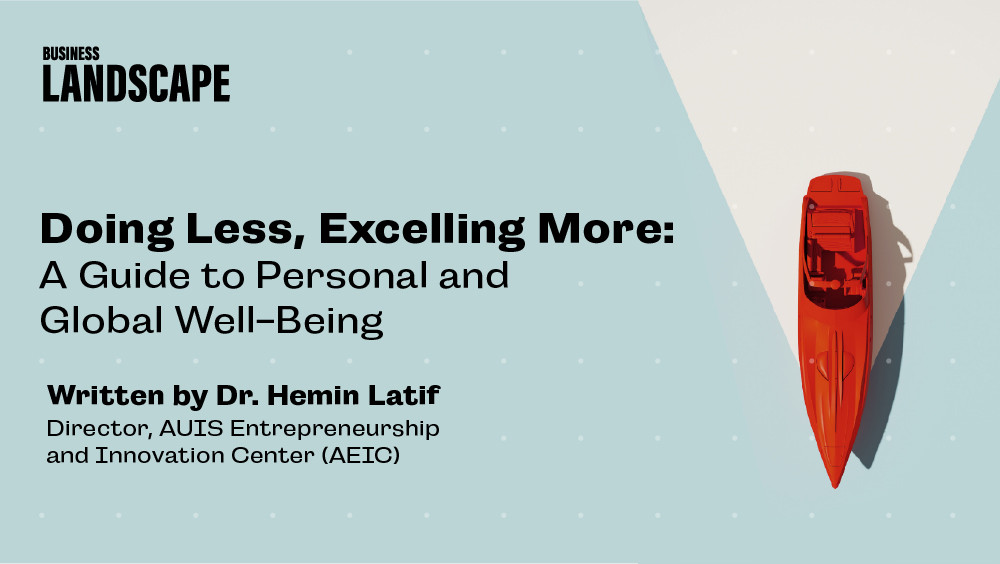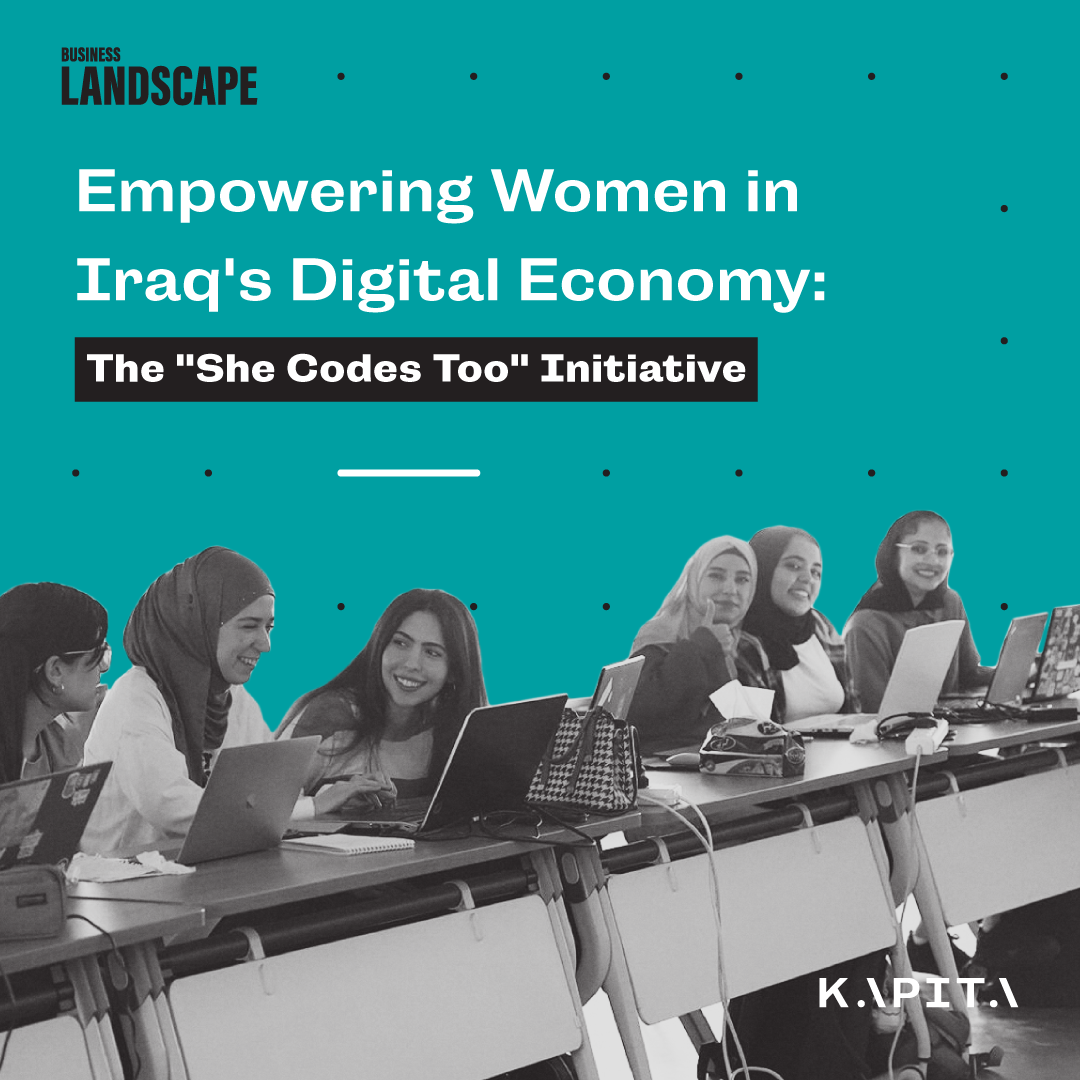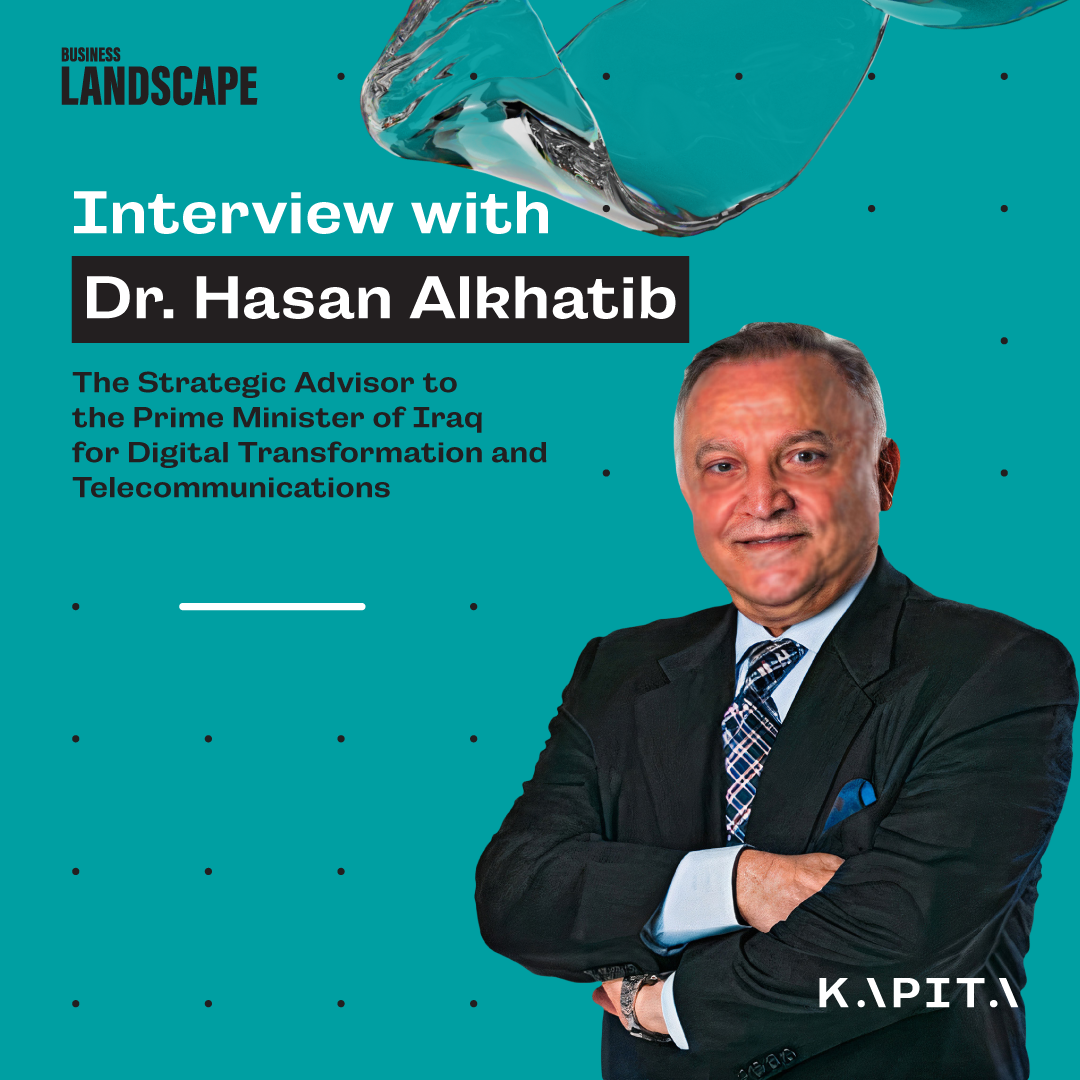Doing Less, Excelling More: A Guide to Personal and Global Well-Being
Dr. Hemin Latif
Director, AUIS Entrepreneurship and Innovation Center (AEIC)
Why Do Not We Acknowledge it?
How many times did we feel frustrated because someone invites us to a professional event but never follows up, or someone pitches us an idea but starts by stating that they are too busy, or someone visits us to make a deal but never responds to our messages, or someone sends a request in the last minute and states that the deadline is tomorrow?
It is easy to blame them, but have we paused to consider how many times we have probably caused the same frustration to others? The truth is, when we sign up for too many things, get distracted by numerous tasks, or work on things that we do not see as truly worthy of our time, we contribute to a cycle of personal frustration, unmet expectations, and terrible results.
As a professional who has navigated various roles and situations, I have made it one of my life’s missions to advocate for doing less but doing well. I have seen firsthand how this principle can serve us well—not just as individual professionals but also as institutions and as a society and ecosystem at large. This article sheds light on this principle in the hope that it helps others break out of this vicious cycle.
This article is divided into three separate parts that together explore the transformative power of focusing on what truly matters. Each part will share five advantages of this principle from different perspectives. The first part focuses on you, the professional; the next will examine its impact on your entity, whether you are a manager or an employee; and the final part will look at how this philosophy can contribute to a better world for all of us. These benefits are not just theoretical; they are backed by research, expert opinions, and, most importantly, real-life experiences.
Part I: For You, The Professional
1. Improved Focus and Quality of Work
When you are not spread thin over multiple tasks, you can devote more attention and resources to each task, thereby improving the quality of your work. Cal Newport, in his book "Deep Work," argues that the ability to focus without distraction is becoming increasingly rare and valuable in our information-saturated world. Research supports this, showing that multitasking can reduce productivity by as much as 40%. Therefore, by doing less, you are actually setting yourself up to produce higher-quality work. However, what does this mean to you professionally? The answer is next.
2. Enhanced Reputation and Reliability
When you do fewer things but do them exceptionally well, you become known as someone who is reliable and excels in their work. Stephen Covey's classic book "The 7 Habits of Highly Effective People" emphasizes the importance of focusing on important tasks to build a strong reputation. A study published in the Journal of Occupational and Organizational Psychology found that reliability and competence are highly valued in the workplace. By doing less but doing it well, you are not just meeting expectations—you are exceeding them.
And why is that important? A strong professional reputation calls for more impactful opportunities on your behalf. Let's delve into that next.
3. More Opportunities for Meaningful Impact
Focusing on fewer, more significant tasks allows you to make a meaningful impact rather than getting lost in a sea of trivialities. The book "The ONE Thing" by Gary Keller and Jay Papasan argues that extraordinary results are directly determined by how narrow you can make your focus. Research in the Journal of Applied Psychology supports this, showing that employees who focus on core job tasks experience higher job satisfaction and performance. By doing less, you are actually doing more of what truly matters.
Making a meaningful impact is rewarding, but let's not forget the impact it will have on your well-being. That is what comes next.
4. Reduced Stress and Burnout
Taking on too many tasks can lead to stress and eventually burnout, affecting both your mental and physical health. The book "Burnout: The Secret to Unlocking the Stress Cycle" by Emily Nagoski and Amelia Nagoski offers insights into how to break the cycle of stress. The World Health Organization has even recognized burnout as an occupational phenomenon, linking it to chronic workplace stress. By doing less, you are giving yourself the space to recharge and avoid the pitfalls of burnout.
Reducing stress is crucial, but the ultimate goal for many of us is achieving a balanced life. Let's explore how doing less can help you achieve that.
5. Better Work-Life Balance
Doing less allows you to allocate time for personal growth, family, and relaxation, which in turn makes you more effective in your professional life. The book "Essentialism: The Disciplined Pursuit of Less" by Greg McKeown discusses the importance of making life more meaningful through less. A Harvard Business Review article even highlights that achieving a work-life balance is crucial for long-term career success and well-being. By focusing on what is essential, you are creating a life that's not just successful but also fulfilling.
Part II: For Your Entity, Whether You Are a Manager or an Employee
1. Increased Employee Satisfaction and Retention
When institutions prioritize quality over quantity, employees feel more valued and less overwhelmed. This leads to higher job satisfaction and retention rates. Daniel H. Pink, in his book "Drive: The Surprising Truth About What Motivates Us," discusses how autonomy and purpose can increase job satisfaction. Studies have shown that job satisfaction is directly linked to employee retention, which in turn reduces the costs associated with high turnover.
The benefits of satisfied and loyal employees are numerous, but let us also consider how this focus on doing less but doing it well can enhance your organization's reputation.
2. Enhanced Organizational Reputation
An institution that focuses on doing fewer things but doing them exceptionally well will build a strong reputation for excellence and reliability. Jim Collins' book "Good to Great" emphasizes the importance of focusing on what an organization can excel at. A strong organizational reputation has been linked to increased customer loyalty and stakeholder trust.
A stellar reputation is a valuable asset, but it is also important to look at how this philosophy can streamline your operations and reduce costs.
3. Streamlined Operations and Reduced Costs
By focusing on core competencies and eliminating unnecessary tasks, institutions can streamline operations and reduce overhead costs. The book "Lean Thinking" by James P. Womack and Daniel T. Jones outlines how streamlining operations can lead to significant cost savings. Case studies have shown that lean management practices can lead to operational efficiencies and cost reductions.
While cost-saving is crucial, it is equally important to consider how a focused approach can improve decision-making across the board.
4. Improved Decision-Making
When an institution focuses on doing less but doing it well, it allows for clearer objectives and better decision-making at all levels. Daniel Kahneman's "Thinking, Fast and Slow" discusses how cognitive biases can affect decision-making and how focus can mitigate these effects. Studies in organizational behavior have shown that clear objectives lead to better decision-making and outcomes.
Clear decision-making is essential, but what about the broader impact your institution can have on society and the environment?
5. Greater Social and Environmental Impact
Institutions that focus on fewer, more meaningful initiatives are more likely to make a significant social and environmental impact. Andrew Savitz's "The Triple Bottom Line" argues that organizations can benefit from focusing on social and environmental as well as financial bottom lines. Studies have shown that companies with a focus on social responsibility outperform their peers in the long run.
Part III: For the Larger Good, the Society and the World
1. Enhanced Community Well-Being
When individuals and institutions focus on doing less but doing it well, the ripple effect can lead to improved well-being in the community. Dan Buettner's book "The Blue Zones" discusses how certain communities thrive due to focused, meaningful activities. Studies have shown that community well-being is intrinsically linked to individual and institutional practices.
The well-being of our communities is essential, but what about the sustainability of our actions?
2. Sustainable Development
Focusing on fewer, more impactful initiatives can contribute to more sustainable development practices. The book "Cradle to Cradle" by William McDonough & Michael Braungart talks about the importance of sustainable design. The United Nations' Sustainable Development Goals also emphasize the need for focused efforts in achieving sustainability.
Sustainability is crucial, but it is also important to consider how our actions impact resource utilization.
3. Reduced Resource Waste
Doing less but doing it well can lead to more efficient use of resources, reducing waste. Eric Ries' "The Lean Startup" discusses how efficiency can be achieved in various aspects of life, not just in business. Studies on resource management show that efficiency leads to less waste, which is beneficial for society as a whole.
Efficiency is key, but let's also consider how a focused approach can strengthen our social fabric.
4. Strengthened Social Fabric
When we focus on doing fewer things but doing them well, we can invest more in relationships and community, thereby strengthening the social fabric. Robert D. Putnam's "Bowling Alone" discusses the decline of social capital and how focused efforts can rebuild it. Studies have shown that strong social ties are crucial for societal well-being.
Strong social ties are important, but mental health is often an overlooked aspect of societal well-being.
5. Greater Focus on Mental Health
A society that values doing less but doing it well is more likely to prioritize mental health. Johann Hari's "Lost Connections" explores how modern life contributes to mental health issues and how a focused approach can alleviate them. The World Health Organization has emphasized the importance of mental health for overall societal well-being.
In conclusion, it is evident that "doing less, but doing well" is more than a personal or institutional strategy—it is a blueprint for a better world. This piece, hopefully, has not only given you a fresh perspective on the transformative power of doing less but doing it exceptionally well but also inspired you to take action. It is essential to prioritize what truly matters so we can work on it better and strive to deliver a higher-quality result.
Lastly, John Doer shares a very profound statement in his book “Measure What Matters”, “So many people work very hard but accomplish very little.” Do not be one of those hard-working but little-accomplishing people. It is not what you can do; but rather what is worth doing, and if something is worth doing, then it is worth doing well. So, let’s do less but do well for a better life for you, a better impact for your institution, and a better world for all of us.






